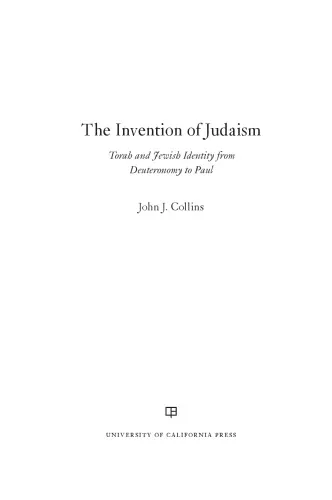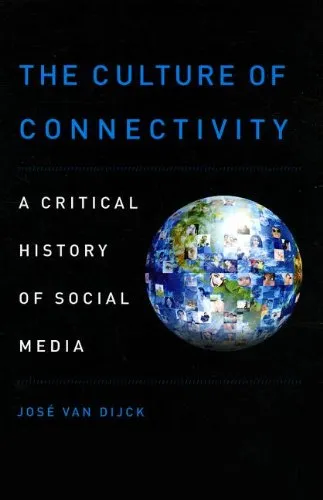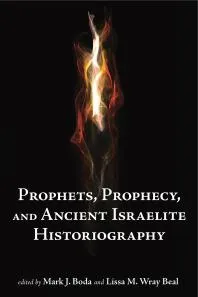The Invention of Judaism: Torah and Jewish Identity from Deuteronomy to Paul
4.6
بر اساس نظر کاربران

شما میتونید سوالاتتون در باره کتاب رو از هوش مصنوعیش بعد از ورود بپرسید
هر دانلود یا پرسش از هوش مصنوعی 2 امتیاز لازم دارد، برای بدست آوردن امتیاز رایگان، به صفحه ی راهنمای امتیازات سر بزنید و یک سری کار ارزشمند انجام بدینکتاب های مرتبط:
معرفی کتاب
کتاب «The Invention of Judaism: Torah and Jewish Identity from Deuteronomy to Paul» نوشته John J. Collins به بررسی تحولات تاریخی و فرهنگی یهودیت از دوران کتاب Deuteronomy تا زمان Paul میپردازد. این کتاب به نحوه تفسیر و تعریف مجدد Jewish Identity و نقش Torah در این فرآیند متمرکز است.
خلاصهای از کتاب
این کتاب به کاوش در تاریخ و مفهوم Torah از لحظه تأسیس تا توسعههای متعدد در دوران پس از تبعید و در طول زمانهای یونانی و رومی میپردازد. Collins به بررسی این موضوع میپردازد که چگونه Torah به عنوان یک متن دینی تأثیرگذار شناخته شد و چگونه این تأثیر بر Jewish Identity تأثیر گذاشت. او همچنین به تحلیل نقش مفسران و فلاسفهای میپردازد که در تکوین یهودیت نقش داشتند و مطالعهای جامع از تعاملات پیچیده فرهنگی و دینی ارائه میدهد که یهودیت را به شکلی که امروز میشناسیم شکل دادهاند.
نکات کلیدی
- Torah به عنوان محور اصلی Jewish Identity مطرح میشود و روشهایی که در طول زمان مورد تفسیر قرار گرفته است را بررسی میکند.
- تحلیل دقیق از متون مقدس و تأثیرات فرهنگی و سیاسی بر تفسیر آنها.
- نقش شخصیتهایی مانند Moses و Paul در تحولات یهودیت.
- نقد و بررسی تأثیرات خارجی از جمله فرهنگهای یونانی و رومی بر یهودیت.
نقلقولهای معروف از کتاب
«Torah بیش از یک قانون دینی صرف است؛ یک منشور فرهنگی است که هویت یهودی را شکل میدهد.»
«جنبشهایی که در سراسر تاریخ برای تفسیر Torah رخ دادند، تنها برای زنده نگه داشتن متون گذشته نبودند، بلکه برای تطبیق و بازسازی هویت یهودی در مواجهه با تغییرات جهانی بود.»
چرا این کتاب اهمیت دارد؟
این کتاب بینش عمیقی در نحوه شکلگیری و تطور Jewish Identity ارائه میدهد. با تحلیل دقیق و موشکافانه متون و تفسیرهای مختلف، Collins نگاهی تازه به نحوه تعامل یهودیت با محیطهای فرهنگی و سیاسی اطراف خود ارائه میدهد. کتاب برای علاقمندان به مطالعات دینی، تاریخی و فرهنگی یک منبع ارزشمند به حساب میآید که آموزههای بسیاری برای درک بهتر چگونگی تعریف هویتهای دینی و فرهنگی ارائه میدهد.
Welcome to an exploration of the fundamental constructs behind Jewish identity through "The Invention of Judaism: Torah and Jewish Identity from Deuteronomy to Paul" authored by the renowned scholar, John J. Collins. This comprehensive introduction will weave through the profound insights offered in this pivotal work, with a focus on its detailed summary, significant takeaways, noteworthy quotations, and the critical importance of this book in today's scholarly discourse.
Detailed Summary of the Book
"The Invention of Judaism" delves into the formation of Jewish identity through the pivotal influence of the Torah across distinct historical epochs. Collins navigates the reader through the transformation of Judaism from a local affair to a world religion, investigating texts and traditions that define Jewish self-understanding. By scrutinizing both the literary history of the texts and their practical implications for Jewish communities, Collins examines how the Torah served as a unifying factor for Jewish identity.
The book traverses periods from the composition of Deuteronomy to the writings of Paul, illustrating how diverse interpretations and emphases have shaped Judaism. Collins provides a critical analysis of how the Torah was integral to the socio-political definition of the Jewish people, impacting not merely religious beliefs but also cultural and national identity. His inquiry widens to consider the role of external influences such as Hellenization and Roman rule in shaping Jewish thought and practice.
Key Takeaways
- Judaism as a Construct: The book argues that the recognizable form of Judaism today is a construct that emerged through historical processes and theological developments rather than as a static, divine ordinance.
- The Role of Torah: The Torah is highlighted not merely as a religious scripture but as a dynamic socio-cultural framework that unified disparate Jewish communities.
- Diverse Interpretations: Collins emphasizes the multiplicity within Judaism, showcasing how varied interpretations of the Torah influenced the religion's evolution.
- Historical Context: Understanding Judaism requires delving into its historical contexts, including the external pressures and internal adaptations that shaped its doctrines and practices.
Famous Quotes from the Book
"The Torah is not merely a book of law but a formative narrative that encapsulates the identity and aspirations of a people."
"Jewish identity has been a dynamic construct, continually reshaped by the forces of history and the interpretations of its sacred texts."
Why This Book Matters
John J. Collins' "The Invention of Judaism" is not merely a historical recounting but a profound exploration into how religions can emerge, evolve, and influence societal structures and identity. Its relevance extends beyond the field of Judaic studies into broader discussions about religious identity, historical narrative, and cultural evolution.
In an era where identity politics and cultural heritage are at the forefront of social discourse, Collins' insights highlight the role of religious tradition in shaping collective identity. By dissecting the processes by which Judaism, as we know it today, was constructed, this book provides invaluable perspectives on understanding how ancient texts continue to wield influence in modern contexts.
Furthermore, this work emboldens scholars and enthusiasts alike to question the static perceptions of religious identity and encourages a re-examination of how sacred texts serve as vessels for cultural transformation and continuity over time. "The Invention of Judaism" serves as both a foundational text in understanding Jewish history and an exemplar of how ancient texts continue to inform contemporary religious and social narratives.
دانلود رایگان مستقیم
شما میتونید سوالاتتون در باره کتاب رو از هوش مصنوعیش بعد از ورود بپرسید
دسترسی به کتابها از طریق پلتفرمهای قانونی و کتابخانههای عمومی نه تنها از حقوق نویسندگان و ناشران حمایت میکند، بلکه به پایداری فرهنگ کتابخوانی نیز کمک میرساند. پیش از دانلود، لحظهای به بررسی این گزینهها فکر کنید.
این کتاب رو در پلتفرم های دیگه ببینید
WorldCat به شما کمک میکنه تا کتاب ها رو در کتابخانه های سراسر دنیا پیدا کنید
امتیازها، نظرات تخصصی و صحبت ها درباره کتاب را در Goodreads ببینید
کتابهای کمیاب یا دست دوم را در AbeBooks پیدا کنید و بخرید
1623
بازدید4.6
امتیاز0
نظر98%
رضایتنظرات:
4.6
بر اساس 0 نظر کاربران
Questions & Answers
Ask questions about this book or help others by answering
No questions yet. Be the first to ask!















